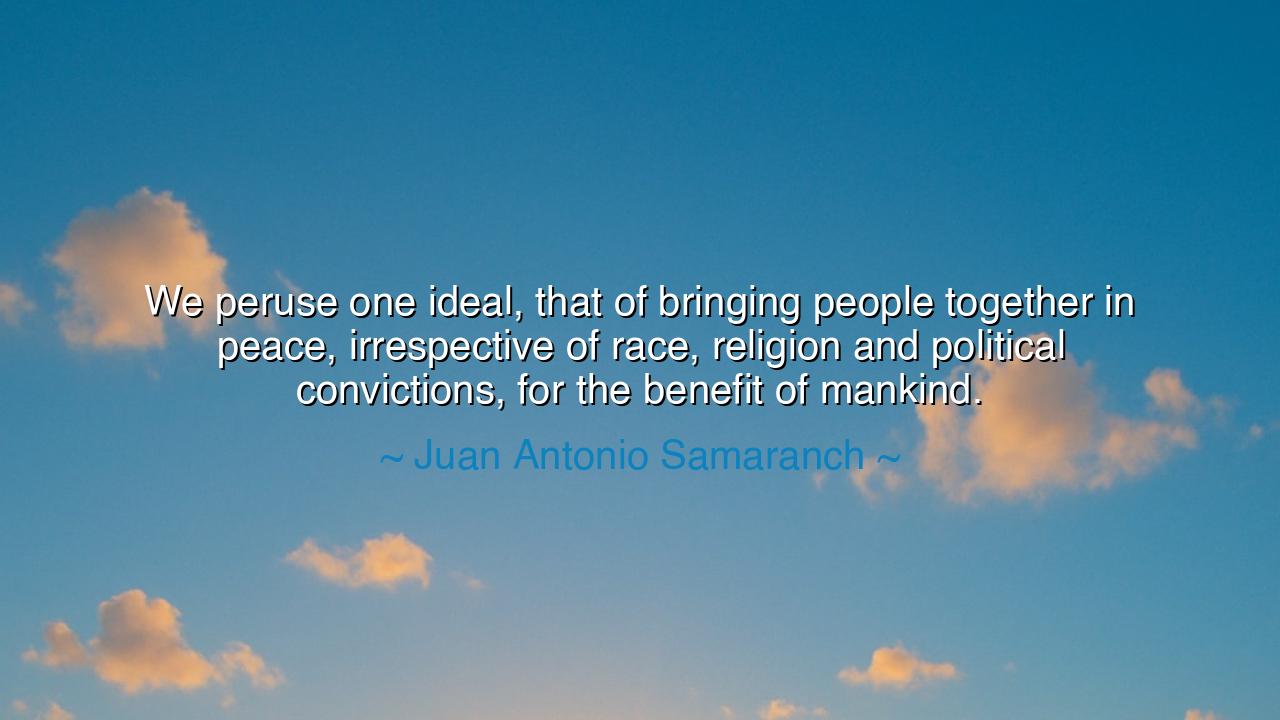
We peruse one ideal, that of bringing people together in peace
We peruse one ideal, that of bringing people together in peace, irrespective of race, religion and political convictions, for the benefit of mankind.






In the words of Juan Antonio Samaranch, the noble steward of the Olympic spirit, we are reminded of a timeless truth: “We peruse one ideal, that of bringing people together in peace, irrespective of race, religion and political convictions, for the benefit of mankind.” This declaration is not mere rhetoric, but a sacred invocation—a call that echoes through the ages, summoning all who dwell upon the earth to remember the unity from which humanity was born. It speaks to the ancient yearning in the human soul—to belong not merely to a nation or creed, but to the vast and eternal family of humankind.
This ideal finds its origin in the spirit of the Olympic Games, reborn in the modern era through Samaranch’s devoted service as President of the International Olympic Committee. Yet the roots reach far deeper—into the soil of ancient Greece, where the sacred truce of Ekecheiria was proclaimed, halting wars so that athletes might gather in peace. For a few shining days, the swords were lowered, the shields rested, and enemies became guests. The Games were not only contests of strength, but ceremonies of reconciliation, where the human spirit was tested and celebrated under the gaze of the gods. Samaranch, standing centuries later, sought to rekindle that divine flame in a fractured modern world.
The essence of his words lies in the pursuit of peace—a peace not born of silence or submission, but of understanding, forged in the fire of diversity. To bring people together “irrespective of race, religion and political convictions” is to defy the boundaries that humankind itself has drawn in fear. It is to believe that human dignity transcends identity, that the heart of one beats in harmony with the heart of another, no matter the color of the skin or the language of prayer. In a time when nations still clash and ideologies divide, Samaranch’s ideal stands like a lighthouse amidst the storm.
Consider the story of Nelson Mandela, who, after 27 years of imprisonment, emerged not with vengeance in his heart, but with forgiveness. When South Africa hosted the 1995 Rugby World Cup, Mandela donned the jersey of the once-hated Springboks, the symbol of white dominance, and stood before the world as a servant of reconciliation. His act united a nation that had been torn apart by race and hatred. The cheers that filled the stadium were not only for victory in sport, but for victory of the human spirit—the same spirit that Samaranch believed could uplift the entire world.
This ideal is no easy pursuit. To walk the path of peace requires courage—more courage than any battle. It demands that one silence the thunder within, that one listen not with ears alone, but with the heart. It asks us to see the reflection of ourselves in those we do not understand. The weak man scorns what he cannot control; the wise man embraces what he cannot comprehend. In this embrace lies the seed of harmony, from which all prosperity and progress may bloom.
Let us not mistake Samaranch’s words as the dream of an idealist, but as the blueprint of survival for the human race. For in an age of division, of cold technology and fleeting loyalties, only the warmth of human connection can sustain us. The world has seen the ruins that hatred builds—let it now witness the monuments of unity. The torch of peace must be carried not by a few leaders or athletes, but by all souls who dwell beneath the same sky.
So, my children, the lesson is this: seek the common light that shines in every person you meet. When you find difference, do not retreat—approach. When you feel anger, transform it into curiosity. When you are wronged, answer not with vengeance, but with the quiet strength of understanding. Build bridges with your words, and sanctuaries with your deeds. For to bring people together in peace is not only to serve mankind—it is to fulfill the highest calling of the human heart.
In your daily life, begin where you stand. Speak kindly where there is conflict. Share with those unlike yourself. Defend the dignity of every person you encounter, and remember that the true measure of greatness lies not in conquest, but in compassion. As Samaranch envisioned, let us peruse one ideal, and in so doing, let us become one people, united not by blood, but by the boundless will to live together in peace, for the everlasting benefit of mankind.






AAdministratorAdministrator
Welcome, honored guests. Please leave a comment, we will respond soon